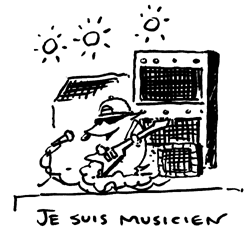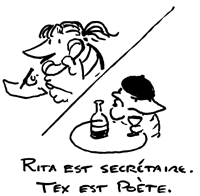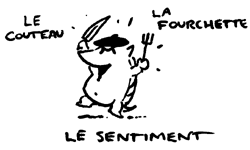Nouns
Gender: Masculine and Feminine
In French, a noun is always feminine or masculine. It is introduced by a determiner, which usually indicates the gender of the noun.
people
When a noun refers to a person, the gender is determined by the person’s sex (although some exceptions do exist).
In general, the feminine form of the noun is formed by adding an -e to the masculine noun. Note that the addition of the -e changes the pronunciation in some words:
| Joe-Bob est étudiant, Tammy est aussi étudiante. | Joe-Bob is a student, Tammy is a student |
| Tex est ami avec Joe-Bob, Tammy est aussi amie avec Joe-Bob. | Tex is Joe-Bob’s friend, Tammy is also Joe-Bob’s friend. |
There are cases when the feminine form of the noun changes more drastically.
| Edouard: Je suis serveur. Tammy: Je ne suis pas serveuse. |
Edouard: I’m a waiter. Tammy: I’m not a waiter. |
| Trey: Je suis musicien. Tammy: Je ne suis pas musicienne. |
Trey: I’m a musician. Tammy: I’m not a musician. |

| Tex: Je suis un séducteur. Bette: Je suis une séductrice. |
Tex: I’m a womanizer. Bette: I’m a seductress. |
| Joe-Bob: Pour le travail, je ne suis pas champion. Fiona: C’est moi qui suis championne. |
Joe-Bob: I’m not a champion at working. Fiona: I’m the one who is a champion. |
| Tex: Je suis le copain de Tammy. Tammy: Je suis la copine de Tex. |
Tex: I’m Tammy’s pal. Tammy: I’m Tex’s pal. |
In general, when the masculine noun ends in -e, the feminine noun remains unchanged. Only the determiner or the context indicates if it is a feminine or masculine noun.
| Tex et Rita sont frère et soeur, mais ils ont des métiers tout à fait différents. | Tex and Rita are brother and sister, but they have completely different jobs. |
| Tex est poète. Rita est secrétaire. | Tex is a poet. Rita is a secretary. |
| Tex n’est sûrement pas secrétaire et Rita n’est pas poète non plus. | Tex is certainly not a secretary and Rita is not a poet either. |

animals
The gender of animals is often arbitrary. Some animals are always masculine (un escargot, a snail), others are feminine (la fourmi, ant). However, for some animals there are irregular masculine and feminine forms.
| le chat / la chatte | cat |
| le chien / la chienne | dog |
| le coq / la poule | chicken (rooster / hen) |
| le boeuf, le taureau / la vache | ox / bull / cow |
objects and ideas
The gender of nouns referring to things and abstractions is arbitrary. However, it can often be inferred from the ending of the word. Typically, words ending in -age, -ment, -eau, -phone, -scope, -isme are masculine and those ending in -tion, -sion, -té, -ette, –ance, -ence, -ie, -ure, -ode/-ade/-ude are feminine.

| masculine endings | feminine endings |
| le fromage (cheese) | la salade (salad, lettuce) |
| le monument (monument) | la fourchette (fork) |
| le sentiment (feeling) | la télévision (television) |
| le couteau (knife) | la culture (culture) |
| le téléphone (telephone) | la situation (situation) |
| le microscope (microscope) | la société (society) |
| le romantisme (romanticism) | la différence (difference) |
| la philosophie (philosophy) |
Listen to the dialogue. Feminine nouns are in blue, masculine in black.
| Tammy présente Tex pour la première fois à Bette et Fiona. | Tammy introduces Tex for the first time to Bette and Fiona. |
| Tammy: Tex est un ami de Lyon. C’est un tuteur maintenant! Tex, la minette c’est mon amie Bette, et la fourmi c’est ma copine Fiona. Bette et Fiona sont étudiantes. | Tammy: Tex is a friend from Lyon. He is a tutor now! Tex, the kitty is my friend Bette and the ant is my pal Fiona. Bette and Fiona are students. |
| Bette: Enchantée, Tex! J’adore la culture française. | Bette: Nice to meet you, Tex. I adore French culture. |
| Tex: Ah, donc tu, . . . tu aimes l’existentialisme? | Tex: Ah, so you, . . . you like existentialism? |
| Bette: Euh, oui, bien sûr, Tex. | Bette: Uh, yes, of course, Tex. |

